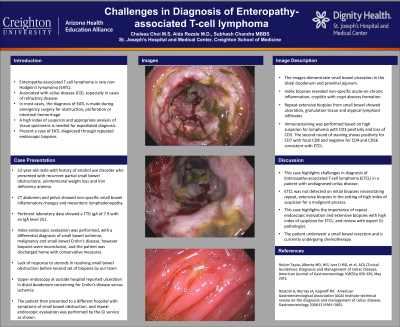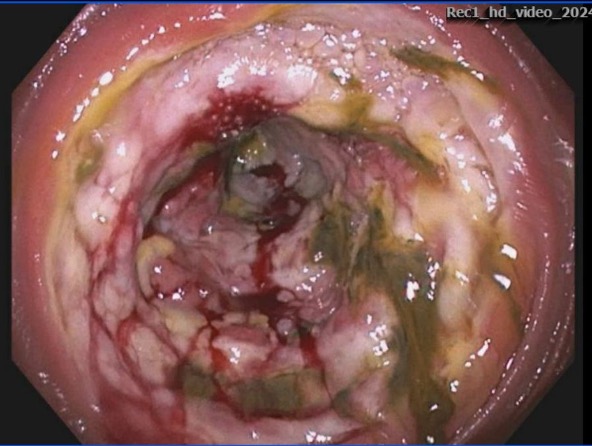Monday Poster Session
Category: Small Intestine
P3231 - Endoscopic Diagnosis and Management of a Rare Case of T-Cell Associated Enteropathy
Monday, October 28, 2024
10:30 AM - 4:00 PM ET
Location: Exhibit Hall E

Has Audio
- CC
Chelsea H. Choi, MS
Creighton University School of Medicine
Phoenix, AZ
Presenting Author(s)
Chelsea H. Choi, MS1, Aida Rezaie, MD2, Subhash Chandra, MBBS, FACG3
1Creighton University School of Medicine, Phoenix, AZ; 2Creighton University, Phoenix, AZ; 3Creighton University Medical Center, Phoenix, AZ
Introduction: Enteropathy-associated T-cell lymphoma is rare non-Hodgkin’s lymphoma (EATL) with an annual incidence of 0.5 to 1 per million. EATL is associated with celiac disease (CD), especially in cases of refractory disease. In most instances, diagnosis of EATL is made during emergency surgery performed for obstruction, perforation or intestinal hemorrhage. A high index of suspicion and appropriate analysis of tissue specimens may be associated with expediated diagnosis and management in patients. We present a rare case of enteropathy associated T-cell lymphoma diagnosed through multiple endoscopic biopsies and expert review.
Case Description/Methods: 52 year old male with a history of multiple hospitalizations for partial small bowel obstructions was admitted with abdominal pain and unintentional weight loss. His labs were notable for iron deficiency anemia, and CT showed small bowel inflammatory changes and mesenteric lymphadenopathy. He underwent an EGD with duodenal biopsies showing mildly increased intraepithelial lymphocytes with villous blunting. His colonoscopy was normal. He was subsequently discharged home and lost to follow-up. During a second admission for similar complaints, rpeat EGD revealed multiple clean based ulcers and scalloping in the duodenum, and a completely obstructing proximal jejunum stricture at least 15 cm. Biopsies of the stricture revealed acute on chronic inflammation, increased intraepithelial lymphocytes, cryptitis with crypt abscess formation. The patients TTG IgA was 7.9 with an IgA level 251, and he was diagnosed with celiac disease. The stricture was thought to be enteropathy associated T-cell lymphoma given the clinical presentation. The patient underwent surgical resection and primary anastomosis of the jejunal stricture. Tissue specimens were sent for expert GI pathological review and found to be consistent with enteropathy-associated T cell lymphoma likely from CD.
Discussion: This is a rare case of undiagnosed celiac disease complicated by enteropathy associated T-cell lymphoma. Type 2 refractory celiac disease (RCD2) is most commonly associated with aberrant clonal T-cells and EATL. While initial biopsies were inconclusive of both celiac disease and lymphoma, obtaining additional biopsies and sending them for expert GI pathological review expedited diagnosis and management of this patient.

Disclosures:
Chelsea H. Choi, MS1, Aida Rezaie, MD2, Subhash Chandra, MBBS, FACG3. P3231 - Endoscopic Diagnosis and Management of a Rare Case of T-Cell Associated Enteropathy, ACG 2024 Annual Scientific Meeting Abstracts. Philadelphia, PA: American College of Gastroenterology.
1Creighton University School of Medicine, Phoenix, AZ; 2Creighton University, Phoenix, AZ; 3Creighton University Medical Center, Phoenix, AZ
Introduction: Enteropathy-associated T-cell lymphoma is rare non-Hodgkin’s lymphoma (EATL) with an annual incidence of 0.5 to 1 per million. EATL is associated with celiac disease (CD), especially in cases of refractory disease. In most instances, diagnosis of EATL is made during emergency surgery performed for obstruction, perforation or intestinal hemorrhage. A high index of suspicion and appropriate analysis of tissue specimens may be associated with expediated diagnosis and management in patients. We present a rare case of enteropathy associated T-cell lymphoma diagnosed through multiple endoscopic biopsies and expert review.
Case Description/Methods: 52 year old male with a history of multiple hospitalizations for partial small bowel obstructions was admitted with abdominal pain and unintentional weight loss. His labs were notable for iron deficiency anemia, and CT showed small bowel inflammatory changes and mesenteric lymphadenopathy. He underwent an EGD with duodenal biopsies showing mildly increased intraepithelial lymphocytes with villous blunting. His colonoscopy was normal. He was subsequently discharged home and lost to follow-up. During a second admission for similar complaints, rpeat EGD revealed multiple clean based ulcers and scalloping in the duodenum, and a completely obstructing proximal jejunum stricture at least 15 cm. Biopsies of the stricture revealed acute on chronic inflammation, increased intraepithelial lymphocytes, cryptitis with crypt abscess formation. The patients TTG IgA was 7.9 with an IgA level 251, and he was diagnosed with celiac disease. The stricture was thought to be enteropathy associated T-cell lymphoma given the clinical presentation. The patient underwent surgical resection and primary anastomosis of the jejunal stricture. Tissue specimens were sent for expert GI pathological review and found to be consistent with enteropathy-associated T cell lymphoma likely from CD.
Discussion: This is a rare case of undiagnosed celiac disease complicated by enteropathy associated T-cell lymphoma. Type 2 refractory celiac disease (RCD2) is most commonly associated with aberrant clonal T-cells and EATL. While initial biopsies were inconclusive of both celiac disease and lymphoma, obtaining additional biopsies and sending them for expert GI pathological review expedited diagnosis and management of this patient.

Figure: T-cell associated enteropathy
Disclosures:
Chelsea Choi indicated no relevant financial relationships.
Aida Rezaie indicated no relevant financial relationships.
Subhash Chandra indicated no relevant financial relationships.
Chelsea H. Choi, MS1, Aida Rezaie, MD2, Subhash Chandra, MBBS, FACG3. P3231 - Endoscopic Diagnosis and Management of a Rare Case of T-Cell Associated Enteropathy, ACG 2024 Annual Scientific Meeting Abstracts. Philadelphia, PA: American College of Gastroenterology.
